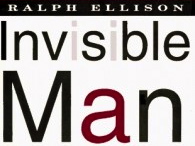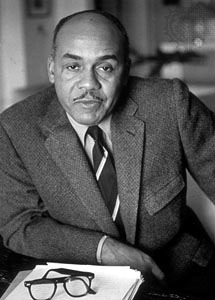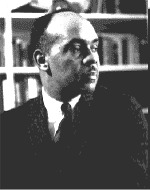Invisible Man

Selections from Ralph Ellison’s Invisible Man
Senior Project. Brief Dramatization of selected scenes from Invisible Man. The story of a young, college-educated black man struggling to survive and succeed in a racially divided society that refuses to see him as a human being. In the form of a first-person narrative, traces the nameless narrator’s journey to enlightenment.
 Invisible Man by Ralph Ellison
Invisible Man by Ralph Ellison
First published in 1952 and immediately hailed as a masterpiece, Invisible Man is one of those rare novels that have changed the shape of American literature. For not only does Ralph Ellison’s nightmare journey across the racial divide tell unparalleled truths about the nature of bigotry and its effects on the minds of both victims and perpetrators, it gives us an entirely new model of what a novel can be.
As he journeys from the Deep South to the streets and basements of Harlem, from a horrifying “battle royal” where black men are reduced to fighting animals, to a Communist rally where they are elevated to the status of trophies, Ralph Ellison’s nameless protagonist ushers readers into a parallel universe that throws our own into harsh and even hilarious relief. Suspenseful and sardonic, narrated in a voice that takes in the symphonic range of the American language, black and white, Invisible Man is one of the most audacious and dazzling novels of our century.
http://amsaw.org/amsaw-ithappenedinhistory-030104-ellison.html
Ralph Ellison
 He was the original angry young man. He was a man before his time. And he was so much more. A mere seven years after the territories of Oklahoma were granted statehood, Lewis Alfred and Ida Millsap Ellison gave birth to a son. They named him Ralph Waldo, in honor of author/philosopher Ralph Waldo Emerson. The year was 1914. Winter clung tenaciously to the horizon. And tough times lay ahead.
He was the original angry young man. He was a man before his time. And he was so much more. A mere seven years after the territories of Oklahoma were granted statehood, Lewis Alfred and Ida Millsap Ellison gave birth to a son. They named him Ralph Waldo, in honor of author/philosopher Ralph Waldo Emerson. The year was 1914. Winter clung tenaciously to the horizon. And tough times lay ahead.
In 1911, Lewis Ellison had come to Oklahoma from Chattanooga, Tennessee, to work as a construction foreman. His wife had grown up on a farm in White Oak, Georgia. When their son was only three, Lewis passed away unexpectedly, and Ida struggled to keep the wolves from the door.
While growing up, young master Ellison showed a talent for music. He performed on the trumpet for friends and family. In high school, he joined the band and planned on becoming a professional musician. Two of his dearest friends were blues singer Jimmy Rushing and trumpeter Hot Lips Page.
With the help of a music scholarship, Ellison entered Tuskegee Institute in Macon County, Alabama in 1933. He hadn’t enough money for train fare, so he hitched his way by rail to the school. Along the way, he passed through Decatur, Alabama, where the Scottsboro trial in which several young black men were accused of raping a white woman was underway. Ellison was nearly arrested simply for being black, and the experience left an indelible impression on him.
 After moving to New York City to study sculpture, Ellison once again changed plans when a chance encounter with Langston Hughes and Richard Wright led him to the Federal Writers’ Project. The two Afro-American authors encouraged Ellison to write stories and book reviews for various New York magazines and newspapers. Ellison left school to devote his life to writing.
After moving to New York City to study sculpture, Ellison once again changed plans when a chance encounter with Langston Hughes and Richard Wright led him to the Federal Writers’ Project. The two Afro-American authors encouraged Ellison to write stories and book reviews for various New York magazines and newspapers. Ellison left school to devote his life to writing.
From 1939 to 1944, Ellison published eight short stories. With each one, his writing grew in both eloquence and complexity. He stopped sharing his work with Wright–some say as a symbol of his growing literary maturity. Ellison said, “…our sensibilities were quite different; and, what I was hoping to achieve in fiction was something quite different from what he wanted to achieve.”
 In 1943, when the Harlem race riots broke out, Ellison–by now an accomplished reporter–covered them for the New York Post. “It was during [World War II] and there was a lot of tension, and after some altercation between a policeman and a Negro soldier and his mother and wife in a bar, Harlem just exploded and they rioted for a day and a night and destroyed many of the white businesses…Most of the business area in Harlem, the neighborhood grocers and so on, was shattered, looted, burned.”
In 1943, when the Harlem race riots broke out, Ellison–by now an accomplished reporter–covered them for the New York Post. “It was during [World War II] and there was a lot of tension, and after some altercation between a policeman and a Negro soldier and his mother and wife in a bar, Harlem just exploded and they rioted for a day and a night and destroyed many of the white businesses…Most of the business area in Harlem, the neighborhood grocers and so on, was shattered, looted, burned.”
Later that year, Ellison enrolled for two years in the Merchant Marines “to contribute to the war, but [not] be in a Jim Crow army.” The next year, while on sick leave, he received a scholarship from the Rosenwald Foundation to write a novel. Affected by the experience of friends in the Army Air Corps, he planned to set his book in a Nazi Germany prisoner-of-war camp, in which the ranking officer is a Negro pilot who has a number of white pilots beneath him in rank.
One day, while starting at his typewriter in a barn on a friend’s Vermont farm, he typed the sentence, “I am an invisible man.” He didn’t know where it came from, but he wanted to pursue the idea, to find out what kind of a person would think of himself as invisible.
The sentence turned into his first and most famous novel, Invisible Man (1953), which tells the life story of a disillusioned African-American man who has gone through a series of misadventures.
“I am an invisible man. No, I am not a spook like those who haunted Edgar Allen Poe; nor am I one of your Hollywood-movie extoplasms. I am a man of substance, of flesh and bone, fiber and liquids–and I might even be said to possess a mind. I am invisible, understand, simply because people refuse to see me. Like the bodiless heads you see sometimes in circus sideshows, it is as though I have been surrounded by mirrors of hard, distorting glass. When they approach me they see only my surroundings, themselves, or figments of their imagination — indeed, everything and anything except me.” – Prologue from Invisible Man
Invisible Man won the National Newspaper Publisher’s Russwurm Award, the Chicago Defender’s Award for its portrayal of the best in American Democracy, and the National Book Award. In choosing Ellison’s work the best of the year, the Book Award judges declared, “In Invisible ManRalph Ellison shows us how invisible we all are to each other. With a positive exuberance of narrative gifts, he has broken away from the conventions and patterns of the tight ‘well-made’ novel.”
In accepting the award, Ellison worried that the judges were “rewarding my efforts rather than my not quite fully achieved attempt at a major novel.” Years later, in an interview for the Paris Review (Number 8), he repeated his fear that the novel was “not an important one,” adding, “I failed of eloquence.”
But history would prove Ellison wrong. Decades later, the book would continue to be held in high esteem. In a Wilson Quarterly poll of professors of American literature conducted in 1978, Invisible Man was selected as the most important novel published in the United States since World War II.
https://www.goodreads.com/book/show/16981.Invisible_Man?from_search=true

